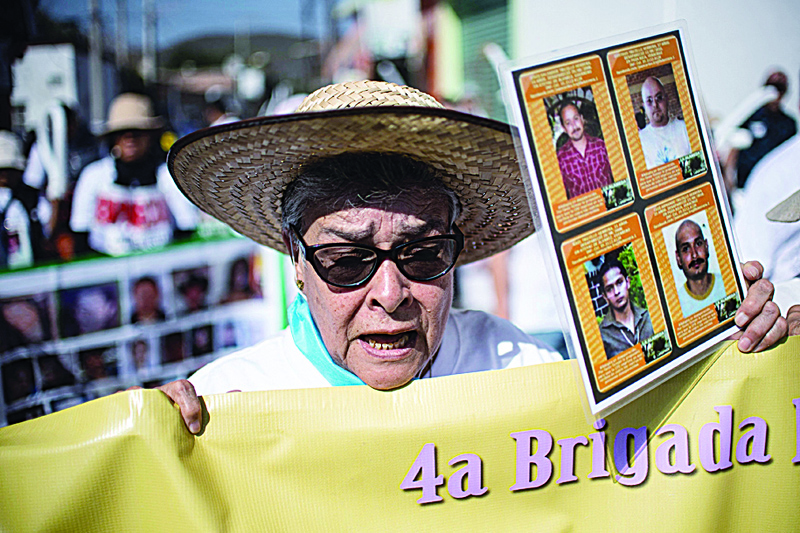 HUITZUCO DE LOS FIGUEROA, Mexico: File photo shows, Mexican Maria Herrera, who looks for four missing sons, holds their portraits during a march as part of the activities of the fourth National Search Brigade, in Huitzuco de los Figueroa, Guerrero state, Mexico. - AFP
HUITZUCO DE LOS FIGUEROA, Mexico: File photo shows, Mexican Maria Herrera, who looks for four missing sons, holds their portraits during a march as part of the activities of the fourth National Search Brigade, in Huitzuco de los Figueroa, Guerrero state, Mexico. - AFPMEXICO CITY: Maria Herrera's life fell apart when first two and then another two of her sons disappeared. Now she dedicates her life to the search for them -- and thousands more missing in violence-wracked Mexico. Jesus Salvador, then 24, and Raul Trujillo, 19, vanished in August 2008 after going to trade gold in Guerrero, a southern state plagued by cartel turf wars. Two years later Gustavo, 28, and Luis Armando, 25, went missing in the eastern state of Veracruz, another hotspot for criminal gangs working with corrupt police.
Both had helped with the search for their brothers while criss-crossing the country for their work as part of the family's gold trading business. Asking too many questions can be deadly in Mexico and one theory is that corrupt cops got rid of the pair after they realized they were searching for missing persons. Their mother, now 72, has turned to any authority willing to listen and spent her savings on private detectives to investigate what she considers to be "forced disappearances."
"The real criminals are in power," Herrera said in her small house in the State of Mexico, which she has left countless times to tour the country with photos of her children and to support other families to do the same. Still, she holds out hope "that our voice is heard, that it resounds and that society unites and wakes up," said Herrera, who is assisted in her quest by her husband and four other children. Because of her tenacity, she has been hailed as a "hero" by the Mexico office of the United Nations High Commissioner for Human Rights.
'I felt helpless'
More than 76,000 disappearances have been reported in Mexico since 1968, according to a national registry of the missing. Nearly 98 percent of them have happened since 2006, when the government deployed the military in the war on powerful drug cartels, triggering a spiral of violence. Since then there have been more than 300,000 murders, which the government blames mostly on organized crime. According to Human Rights Watch, the militarized strategy has resulted in widespread rights violations including enforced disappearances and extrajudicial executions.
Herrera has given up hope of finding her four missing sons alive, but she wants to find their remains to achieve some sort of closure. "I was hoping that I would find my children. But when -- far from finding them and feeling the joy of being together -- another two disappeared, that's when I felt helpless and thought I have no choice but to help others," Herrera said.
"Now we scream. They turned us into wild animals because when they touch your cubs, you defend them with your life," she said. In 2011, during talks between victims and the government, she rebuked then-president Felipe Calderon for his strategy against drug trafficking, "My children were honest and hardworking boys and they were victims of your war," she screamed.
'Living in fear'
Disappointed with the response of the government, in 2013 Herrera and her other children created a network bringing together search organizations from around the country. In 2016 they helped to launch a national search brigade that has discovered clandestine graves in several parts of Mexico, where criminals often bury their victims in hard-to-reach places.
"I never imagined it would come to this. I was a happy woman selling clothes," said Herrera, whose mother taught her from an early age to help those in need. She receives daily calls from families of the disappeared asking for guidance. Since 2008 she has assisted thousands of people searching desperately for missing relatives -- both through official channels and in the field.
She has learned how to hammer metal rods into the ground to release the smell of decaying flesh, and to work painstakingly with picks and shovels to avoid damaging bones. Despite now being a recognized figure, she too worries for her safety. Being a human rights defender in Mexico "is the most difficult thing there is because you are just living in fear that at any moment they will silence you." - AFP









